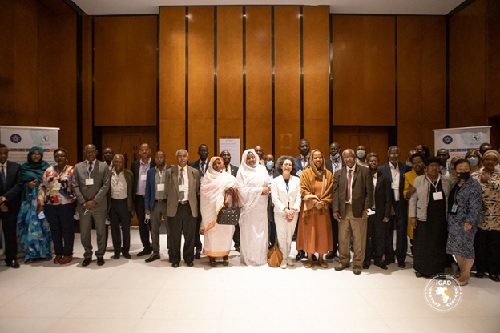
BY TEWODROS KASSA
The Intergovernmental Authority on Development (IGAD) carries a huge population of refugees and internally displaced persons (IDPs). Recent estimates indicate that the region hosts more than 14 million displaced people, excluding voluntary migrants. This includes 4.2 million refugees and 9.6 million IDPs, especially those being forcibly displaced from their villages in some of the IGAD member states due to on-going conflicts.
Education is the most severely affected public good during emergencies triggered by manmade, natural or social catastrophes including the COVID-19 pandemic. The disruption of education and related services not only damages homes or physical infrastructures; but also destroys hopes and aspirations of people whose consequences are felt for generations.
School closure pushes millions of students out of safety zones and exposes them to various social, cultural and economic hardships. Reports of early marriage, teenage pregnancies and sexual harassment, particularly against girls and young women, are rampant.
Over the last two and half years, the COVID-19 pandemic complicates life to this vulnerable group. It also puts immense pressures on member states and host governments due to the growing need to respond to the health and education emergencies. The IGAD Secretariat, in collaboration with development partners, has been providing leadership to coordinate the efforts of member states to facilitate a comprehensive response to the pandemic.
Recently, the 3rd conference of IGAD ministers in charge of education was held in Addis Ababa under the theme: “Accelerating access to inclusive and quality education for refugees, returnees, Internally Displaced Persons (IDPs) and host communities: Shared responsibilities for better results amidst the COVID-19 crisis.”
On the occasion, IGAD Secretariat Social Development Division Director Fathia Alwan said that the region hosts a very large number of refugees. Prior to the advent of the COVID-19, IGAD was building international coalition to facilitate access to quality education for refugees, returnees and host communities in the region. In December 2017, it organized the first high level regional conference of ministers in charge of education in Djibouti.
The Conference adopted the Djibouti Declaration and Plan of Action on education for refugees, returnees and host communities. This was followed by a series of awareness creation platforms, consultative meetings with partners; and biannual meetings of experts and two annual meetings of ministers in charge of education.
Despite the suspension of major activities owing to the COVID-19 lock down in the course of 2020, IGAD has been implementing these and other initiatives adopted by the ministers in charge of education. It also managed to organize the meeting of IGAD experts in charge of education and partners from 06 – 09 December 2021; which came up with strong recommendations; and will be reviewed and confirmed by IGAD Ministers in charge of Education.
“Thus, it is expected to work conjointly to create an enabling environment for refugees and host communities to realize the Djibouti Declaration. Moreover, IGAD adopted “The Djibouti Declaration” in 2017 that committed member states to take concrete measures to promote access to quality education for refugees, returnees, IDPs and host communities.”
As to her, every member states’ contribution is fundamental to ensure the regional vision of attaining inclusive education for all. IGAD has assisted member states to elaborate the National Education Response Plan (NERP) which, among others, will provide directions to the national level realization of the Djibouti Declaration, help mobilize resources for multi-year, predictable and adequate funding; enable IGAD, member states, core partners and other stakeholders to track progresses, generate regional data and take lessons learned for wider dissemination.
Ministry of Education Educational Improvement Director General Yohannes Wogasso told The Ethiopian Herald that Ethiopia plays an exemplary role to the member states through doing its level best to the fulfillment of the Djibouti Declaration.
“Ethiopia is a second home for our neighbors. Therefore, the refugees have the right to access quality education in Ethiopia.”
Ethiopia provides various supports to the refugees in the education sector including psychosocial educations within their camp and together with the host communities.
“More importantly, the on-going three days IGAD’s technical committee and ministerial conference sought to evaluate our performance in availing inclusive education for refugees in the past years and provide new insights to address the challenges,” he reiterated.
As he stated, currently, Ethiopia is providing inclusive education for refugees through establishing education centers in five states such as Gambella, Benishangul Gumuz, Afar, Somali, and Tigray.
The Ethiopian Herald April 2/2022





